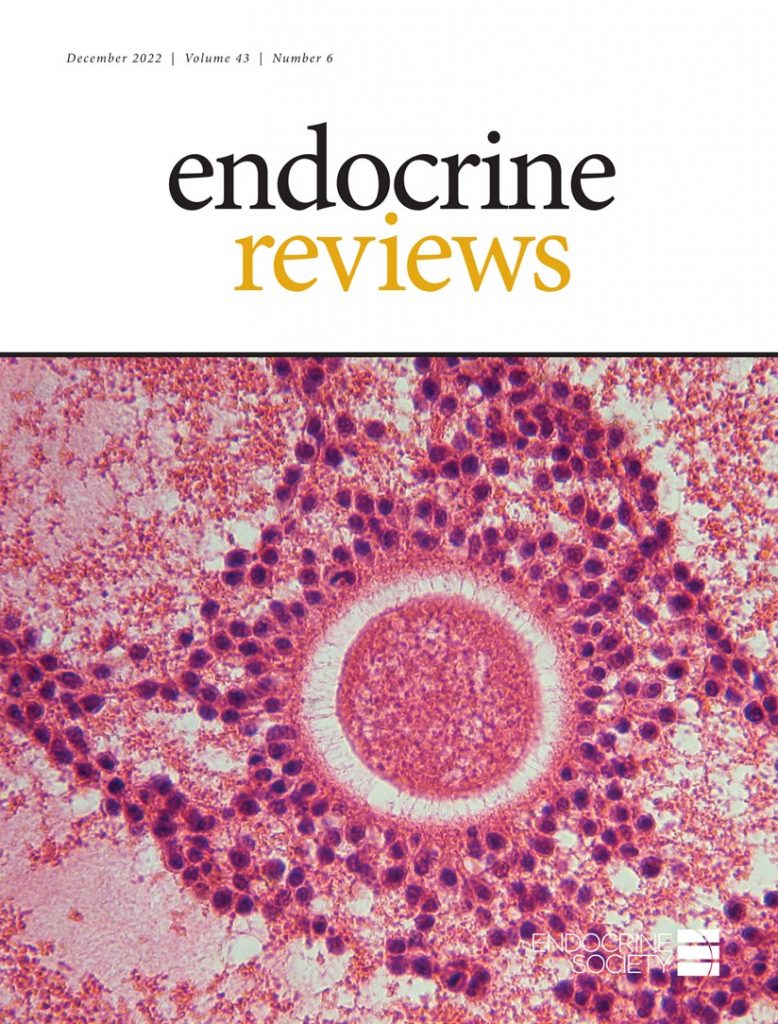
Endocrine News talks to editors from the Endocrine Society journal, Endocrine Reviews, to unearth the endocrine nuggets of 2022!
This may go down as the “Gold Rush of ’22.” Maybe because researchers were more fully able to return to their labs this year after facing pandemic-related challenges for so long, or maybe just because it has been a banner year for endocrinology research, they struck it rich. Whatever the reason, the number and quality of this year’s studies are better than ever.
More than a dozen editors from Endocrine Reviews, Endocrinology, Journal of the Endocrine Society, and The Journal of Clinical Endocrinology & Metabolism (JCEM) share what they consider the top endocrinology studies published in the last 12 (or so) months.
Their picks span just about every endocrine theme: new insights into endocrinopathies like hypogonadotropic hypogonadism, Cushing disease, all forms of diabetes, obesity, aldosteronism, and hypothyroidism are among the breakthroughs. Breast, thyroid, and adrenocortical cancers are now more fully understood. An array of molecules was discovered or further investigated. Endocrine disruptors were found to wreak yet more havoc than previously known. Pathophysiologic mechanisms and pathways were better elucidated, and links uncovered. Collectively, this research shows how study of patients with certain diseases can lead to improvement of care; addresses important and understudied clinical questions; and highlights areas of clinical uncertainty where additional, larger, trials are needed. The breadth of these study topics underscores how endocrinology touches every facet of life.
In this first installment, we see what the editors of Endocrine Reviews have chosen.
From the Editor-in-Chief of Endocrine Reviews

Endocrine Reviews editor-in-chief Ashley Grossman, FMedSci, emeritus professor of endocrinology, University of Oxford; senior research fellow, Green Templeton College; consultant NET endocrinologist, Royal Free London; professor of neuroendocrinology, Barts and the London School of Medicine; and consultant endocrinologist at the London Clinic Centre for Endocrinology, in the U.K., chose “Cytoreductive Surgery of the Primary Tumor in Metastatic Adrenocortical Carcinoma: Impact on Patients’ Survival” from the April issue of The Journal of Clinical Endocrinology & Metabolism (JCEM) by Srougi, V. et al. This survey by nine international groups retrospectively analyzed the effects of cytoreductive therapy on survival in 239 patients with metastatic adrenocortical cancer (ACC), led by a center in São Paulo, Brazil.
“In thinking about the most significant publications in endocrinology over the past 12 months,” Grossman says, “I have been impressed by many ‘clinical approach’ articles and meta-analyses, but for the most part these have not greatly changed my clinical practice. As an active clinician, I am most interested in publications that are not directly concerned with the majority of my patients in my specialist field, but more in those offering novel data for patients whom I would only infrequently see, but whose management is troubling.”
For patients with ACC, this is especially true, he explains. “I see a steady stream of such patients, their outlook is generally (although surprisingly not always) horrid, and survival is poor in spite of chemotherapy and mitotane. New molecular therapies have not made any major impact.” In Grossman’s chosen study, however, “over a mean follow-up of just over five years, the hazard ratio of a beneficial effect of surgery was 3.18; there may also have been a positive effect of metastatectomy. Accepting all the caveats regarding a retrospective analysis, and the fact that survival in all patients is still sadly very poor, nevertheless this is one study that may affect my own management plans for this awful disease,” he says.
“In thinking about the most significant publications in endocrinology over the past 12 months. I have been impressed by many ‘clinical approach’ articles and meta-analyses, but for the most part these have not greatly changed my clinical practice. As an active clinician, I am most interested in publications that are not directly concerned with the majority of my patients in my specialist field, but more in those offering novel data for patients whom I would only infrequently see, but whose management is troubling.”
Ashley Grossman, FMedSci, Editor-in-Chief, Endocrine Reviews
More From the Editors of Endocrine Reviews
Katrin J. Svensson, PhD, assistant professor (Department of Pathology) at Stanford University, Stanford School of Medicine, in Palo Alto, Calif., gives “An Exercise-Inducible Metabolite that Suppresses Feeding and Obesity” from the June issue of Nature by Li, V. L., et al. top billing.
“My top choice this year is the discovery of the exercise-inducible anti-obesity molecule lactoylphenylalanine (Lac-Phe), which was covered by more than 120 news outlets,” Svensson says. “By looking at the plasma metabolome from humans, horses, and mice, these researchers found the top metabolite elevated after exercise to be a molecule called Lac-Phe. Remarkably, the function of this metabolite is to suppress appetite. While exercise obviously burns calories, this study highlights a new mechanism by which physical activity is linked to obesity.”
Eureka! Part II: What the editors of Endocrinology think are the top endocrine discoveries of 2022.

